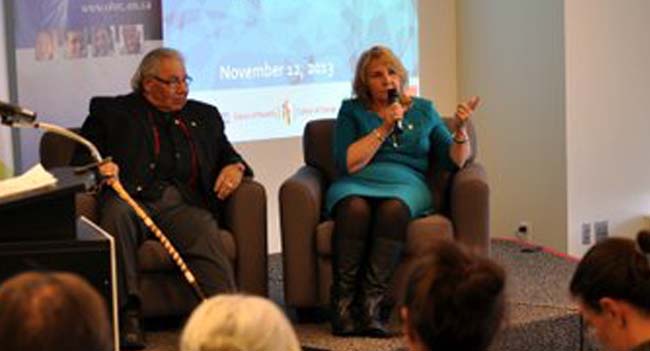Taking action on truth, justice and reconciliation

TORONTO – Community organizations representing various communities of colour organized a day of dialogue to build solidarity with the Aboriginal Communities to promote truth and reconciliation. The event “From Remembrance to Reconciliation – A Shared Community Dialogue on Our Roles as Treaty Peoples” took place on Nov. 12 at Osgoode Professional Development, and marked the 250th anniversary of the Royal Proclamation of 1763 and the 25th anniversary of the Canadian Multiculturalism Act.
“Far too many Canadians – including many peoples of colour and First Peoples, are unaware of the Canadian history of colonization of the Indigenous peoples and the exclusion of communities of colour,” said Avvy Go of the Colour of Poverty/Colour of Change, one of the lead organizers for the event. “It is our hope that today’s dialogue will foster positive relationships among First Peoples and peoples of colour as we support each others’ struggles for justice,” added Ms. Go.
This event was also co-organized by the Ontario Council of Agencies Serving Immigrants, the Ontario Human Rights Commission and the Metro Toronto Chinese & Southeast Asian Legal Clinic, and sponsored by Osgoode Hall Law School York University. The keynote speaker was Justice Murray Sinclair, the Chief Commissioner of the Truth and Reconciliation Commission (TRC).
“The Ontario Human Rights Commission is pleased to be part of this initiative which aims to promote broader public respect for the human rights of Indigenous peoples and peoples of colour in Canada,” said Barbara Hall, Chief Commissioner of the OHRC, and a speaker at the event. “The OHRC looks forward to working with these communities to advance human rights for everyone,” added Ms. Hall.
Close to 200 people attended the community dialogue. In addition to Justice Sinclair and Chief Commissioner Hall, the event featured Phil Fontaine, former AFN Chief as well as speakers from the Aboriginal, African, Chinese Canadian and South Asian Canadian communities about various historical wrongs and their communities’ search for truth and reconciliation.
“We are all Treaty peoples, and we share a collective responsibility to help bring about justice and equality for all. Reconciliation for Indigenous peoples and peoples of colour is an important first step towards that goal,” said Debbie Douglas, Executive Director of Ontario Council of Agencies Serving Immigrants.
Organizers of the event presented and signed on to a statement of Commitment to Truth, Justice and Reconciliation at the event. They asked all the participants to sign on to the statement which calls for, among other things:
- The use of the United Nations Declaration on the Rights of Indigenous Peoples as the framework for working towards ongoing reconciliation between Indigenous and non-Indigenous peoples;
- Reparations for historical wrongs that have yet to be acknowledged and/or redressed by the governments in Canada; and
- The extension of the mandate of the Truth and Reconciliation Commission.


